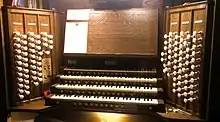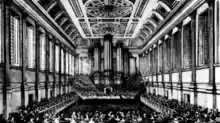

William Hill & Son was one of the main organ builders in England during the 19th century.[1]
The founder
William Hill was born in Spilsby, Lincolnshire in 1789. He married Mary, the daughter of organ-builder Thomas Elliot, on 30 October 1818 in St Pancras Parish Church, and worked for Thomas Elliott from 1825. The company was known as Elliott and Hill until Elliott died in 1832.
When William Hill died in 1870 a memorial window was installed in the church at Spilsby, Lincolnshire.
The company
On Elliot's death in 1832, William Hill inherited the firm. In 1837 he formed a partnership with Federick Davison who left in the following year to form a partnership with John Gray, Gray and Davison.
From 1832 William Hill's elder son William joined him in the firm. From 1855 William Hill's younger son Thomas joined the company and took control after his father's death in 1870.
When Thomas died in 1893 the firm continued under his son, Arthur George Hill, until 1916[2] when it was amalgamated with Norman & Beard into a huge organ-building concern as William Hill & Son & Norman & Beard Ltd. later shortened to Hill, Norman & Beard.
Examples of the firm's work include:
- Birmingham Town Hall, 1832
- Peterborough Cathedral, 1894, subsequently Hill, Norman & Beard (1930/31), Harrison & Harrison (1980-present). Case designed by A. G. Hill.[3]
- Selby Abbey, 1909
- Sydney Town Hall Grand Organ, 1886–89, opened 1890, the largest organ in the world at the time of its construction, with a case designed by A. G. Hill
- Melbourne Town Hall, opened 1872, destroyed by fire 1925
- Adelaide Town Hall, 1877, reconstructed and installed at the Barossa Regional Gallery, Tanunda, South Australia, reopened 2014
- St Andrew's Cathedral, Sydney 1866, rebuilt by Hill, Norman & Beard and Orgues Letourneau
- King's College Chapel, Cambridge, 1834. Rebuilt by Harrison & Harrison in 1934
- Westminster Abbey, 1848. Replaced by Harrison & Harrison in 1937 retaining some of Hill’s pipework.
- Kidderminster Town Hall, Worcestershire, 1855 [4]
- Church of St Mary The Virgin, Tottenham London N17 9XE built from 1889 and received Grade 1 listing in 2004 as a heritage organ due to it being in its original state with Barker lever Action intact and manual air pump working and many stops given the relatively small size of the organ.[5]
- Trinity Methodist Church in Burton-upon-Trent, 1869. After the closing of the church in 2011, the organ was transferred to the Catholic St. Afra church in Berlin, and inaugurated on 22 November 2015. It is regarded as the most significant English organ in Germany.[6]
- St Peter's Church, Streatham 1870
- St John's Church, Torquay 1872
- St Peter's Church Organ, Mundham, 1877
- Corpus Christi College Oxford in The Chapel 1880 [7]
- Thomas Coats Memorial Baptist Church in Paisley 1890.[8]
- St Andrew's, Croydon, 1891, and a replacement in 1906.
- St Augustine's Church, Penarth, 1895 [9]
- Christ Church, Llanfairfechan, Wales 1895/1902.
- St Alban's Church, Ilford, England
- St Peter's Church, Mundham, England
- Christ Church/Crimean Memorial Church, Istanbul,1911
References
- ↑ The Making of the Victorian Organ. Nicholas Thistlethwaite - 1999
- ↑ Obituary: Arthur George Hill, The Musical Times, Vol. 64, No. 965 (1 July 1923), p. 507.
- ↑ "The National Pipe Organ Register - NPOR". www.npor.org.uk. Retrieved 13 April 2022.
- ↑ "William Hill organ". The Hill Organ Promotion Society (HOPS). Retrieved 14 November 2017.
- ↑ "The Organ". St Mary's Church, Tottenham.
- ↑ Eine Hill-Orgel für Berlin Institut St. Philipp Neri, Berlin, 22 Sep 2013
- ↑ "Organ Scholarships | Corpus Christi College Oxford". www.ccc.ox.ac.uk. Retrieved 9 January 2024.
- ↑ "£1000,000 organ fund given a boost". Paisley Daily Express. 17 March 2011.
- ↑ "William Hill organ". Friends of St Augustine's. Retrieved 28 May 2016.

